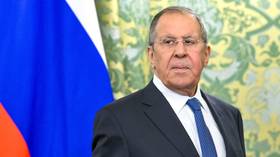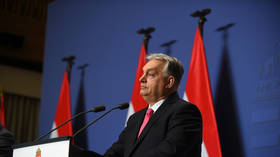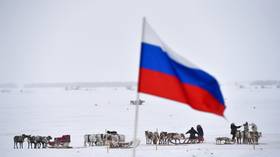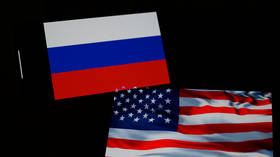Russians helped Iran with nukes – Israel
A list of Russian scientists who allegedly helped Iran to develop a nuclear bomb was handed to the Kremlin by Israel’s Prime Minister Binyamin Netanyahu, The Sunday Times reports.
It is said that Netanyahu came up with concrete evidence of Russians helping the Iranians to make the bomb, The Sunday Times newspaper claims, citing an unnamed source close to the Russian defense minister.
The Israeli leader visited Moscow with Uzi Arad, his national security adviser, and the visit was not publicized.
The prime minister’s office said then that he was in Israel, but later it was revealed that Netanyahu had flown to Moscow and held talks with his Russian counterpart, Vladimir Putin, and with President Dmitry Medvedev, the newspaper writes. Israeli sources say it was a short and tense meeting.
Medvedev later confirmed that Netanyahu was on a secret visit to Moscow, though earlier the Foreign Affairs Ministry had made a different statement.
“Israel’s prime minister made the visit privately, and that was his decision. I can’t say I understand fully what it was connected with, but as our partners decided that way, we took it as a normal thing. I had a conversation with him,”the Russian leader said.
Russian-Iranian nuclear relations
Russia and Iran have a peaceful nuclear cooperation agreement dating back to 1992. It covers the use of nuclear energy in medicine, agriculture, manufacture and research in nuclear physics.
In 2003, Russia participated in constructing a nuclear power plant in Bushehr. Since a 2005 agreement, all fuel used at the power plant has to be returned to Russia.
Activity generated by the Russian-Iranian nuclear agreement is conducted under the supervision of the IAEA.
What’s behind the claims?The statement seems to lack concrete facts proving the Russian scientists’ involvement, and the Israeli claims look to be mere allegations.
Allegations that are yet to be proven according to head of the FSB Nikolay Patrushev, who denied receiving the list of scientists.
“I have no idea, where they [the newspapers] got this info from. At the moment I have no reports of any Russian companies or persons connected to Iran’s nuclear program,” Patrushev told Interfax.
Moreover, the International Atomic Energy Agency (IAEA) has recently made a report on Iran’s nuclear program and it says that the country has enough information and resources of its own to make a nuclear bomb in the near future.
The West met Israel’s claims with caution. US and British sources said that the participation of freelance Russian scientists was a thing of the past.
Israeli officials insist that any Russian scientists working in Iran could do so only with official approval. However, US officials said concern about Russian experts had been raised by the IAEA more than a year ago, but that was about individuals acting without official approval.
“There has been Russian help. It is not the government, it is individuals – at least one helping Iran on weaponization activities, and it is worrisome,” David Albright, a former weapons inspector who is now president of the Institute for Science and International Security, told The Sunday Times.
Russian freelancer assisted Iran with nukes?
Almost a year ago the IAEA investigated whether a Russian scientist helped Iran carry out experiments on nuclear weapon detonation, The New York Times reported, citing European and American officials.
The newspaper reported that UN nuclear watchdog inspectors obtained a long document written in Farsi, according to which the scientist was acting on his own in providing assistance in conducting experiments described in the document.
The unnamed officials told the paper that the “document appeared authentic, without explaining why.” However, the IAEA made it clear the person was a freelancer and was not working on behalf of the Russian Federation.
After the collapse of the Soviet Union, some Russian scientists left to work for other countries.
The New York Times quoted Gary S. Samore, a National Security Council official during the Clinton administration, as saying that, “The Iranians were very active in recruiting and paying Russian scientists to provide them with assistance in their nuclear program.”
Russia considers sanctions against Iran possible
Russia, which usually calls for diplomatic influence rather than further sanctions on Iran, said that it wants full disclosure, or else repercussions will follow.
“We must create comfortable conditions to facilitate Iran’s co-operation, and must create incentives,” Medvedev said at a Pittsburgh press briefing during G20 summit last week.
Meanwhile, tension in Israel over the Iranian nuclear program has been rising for some time already,
Iranian-Israeli relations
Relations between the countries have been tense since the Islamic Revolution in 1979. The country has held an anti-Israel stance since.
The nuclear program of Iran, with its potential to develop nuclear weapons, has been of major concern to Israel. There have even been claims of Israeli plans to strike Iranian uranium enrichment sites.
Recent comments insinuating that Israel is ready to attack Iran and Iranian President Ahmadinejad’s comments to the UN on a new enrichment facility have further strained the already tense relations.
and that’s no secret to the West: the development of Iran’s military cannot but worry Israel. But the fact that should not be forgotten is that while Iran may be planning to build nukes, Israel already has them, despite having no formal right for that. The country’s nuclear arsenal hasn’t been defined yet, despite many calls by the international community to do so.Iran not closer to nuclear bomb
Meanwhile, US President Barack Obama's top security adviser on Sunday dismissed a report that Iran was closer to making an atomic bomb, Reuters reports.
The New York Times reported on Saturday that a confidential analysis by staff of the International Atomic Energy Agency concluded that Iran has acquired "sufficient information to be able to design and produce" a bomb.
"Whether they know how to do it or not is a matter of some conjecture, but what we are watching is what their intent is, and we have been worried about that intent," said National Security Adviser Jim Jones.
However, when asked whether Iran was any closer to making the bomb, Jones denied any such claims.
“No, we stand by the reports that we have put out,” he said.
Iran’s nukes sabotaged?
While Iran is allegedly continuing its uranium enrichment program, the international community, according to some sources, is responding through sabotage of these actions.
“Industrial sabotage is a means to halt the program without military action and attracting attention,” says Mark Pitzpatrick from the International Institute for Strategic Studies.
Sources from various countries involved in obstructing Iran’s nuclear program have told CBS that there are Russian nuclear scientists and Iranian citizens living abroad among those working on the industrial sabotage. Those involved sell Iran equipment with defects which are difficult to notice immediately.
“One of the ways to sabotage the program is to alter the equipment bought by the country on the black market,” Fitzpatrick noted. “Because it is the black market, the buyer often doesn’t know who he is dealing with.”
Representatives of the countries involved in the sabotage actions have reported, under the condition of anonymity, that power-generating unit explosions have been organized.
Some of the technical difficulties which Iran faced in using centrifuges are also reportedly the result of various countries’ participation in political sabotage, CBS reports.
Iran is highly susceptible to industrial sabotage, since the country does not have access to legitimate resources and has been forced into using the black market for its needs.













